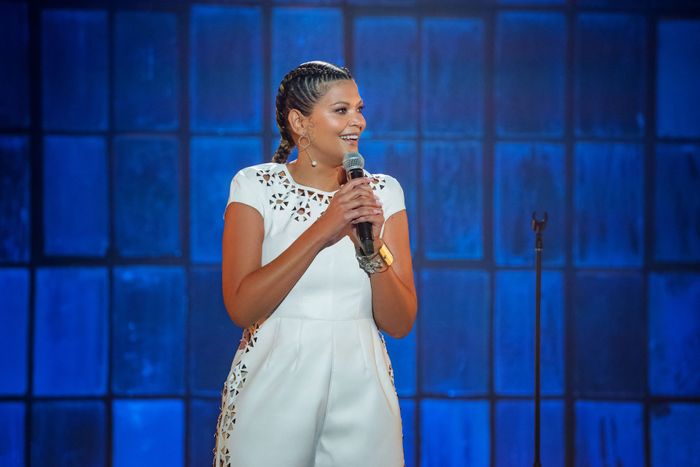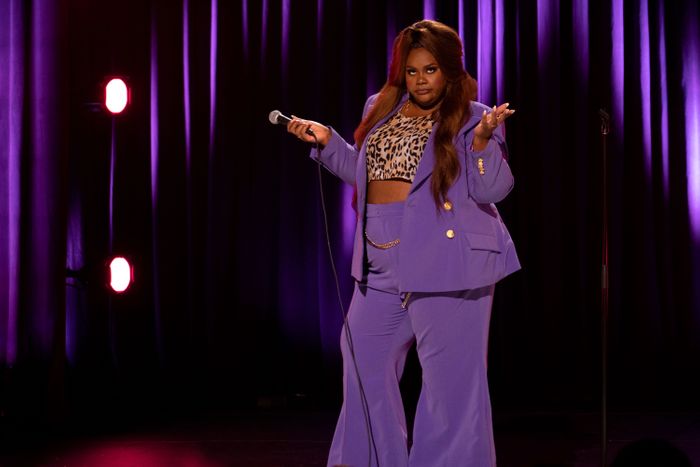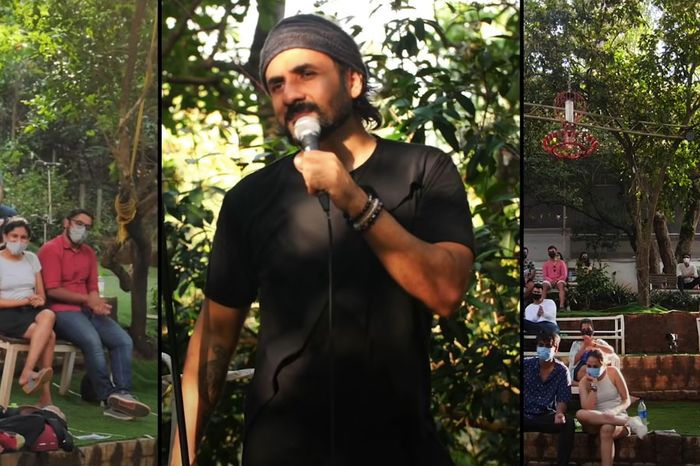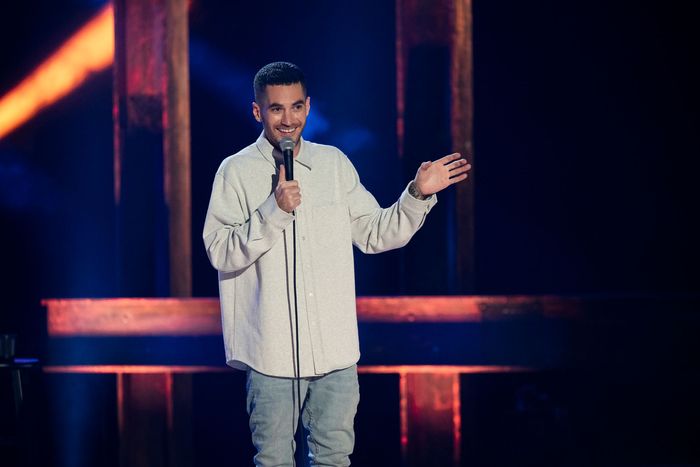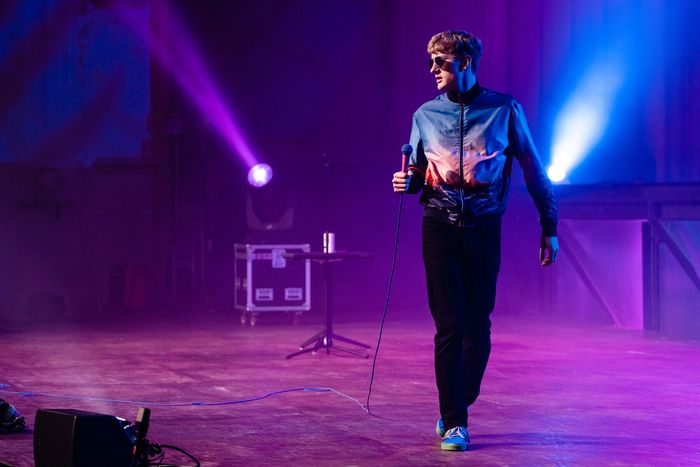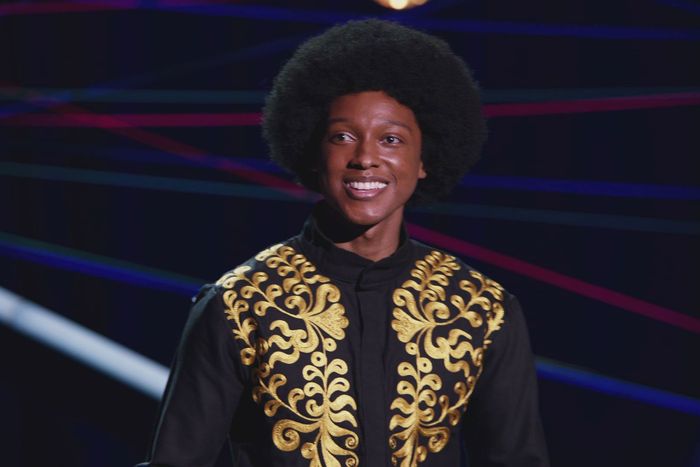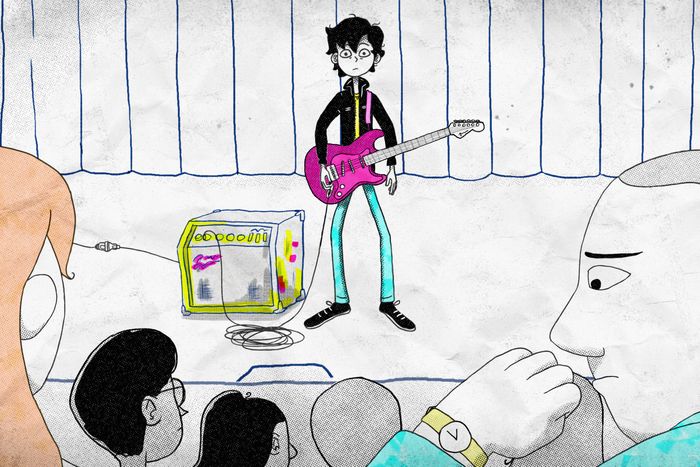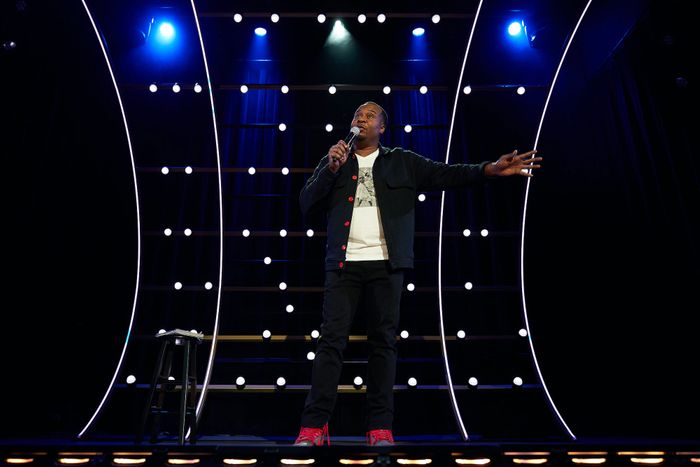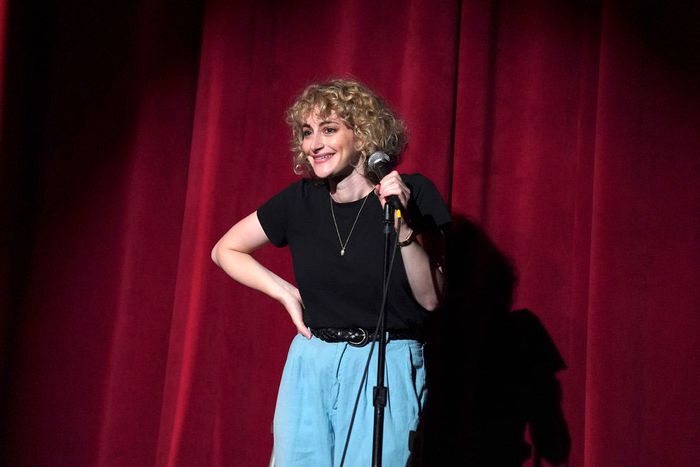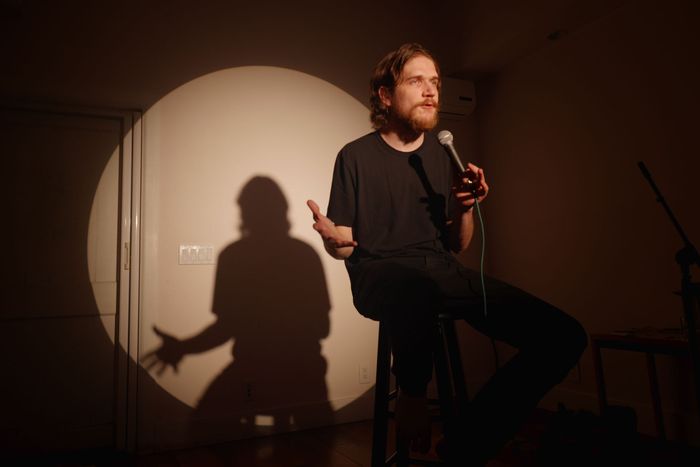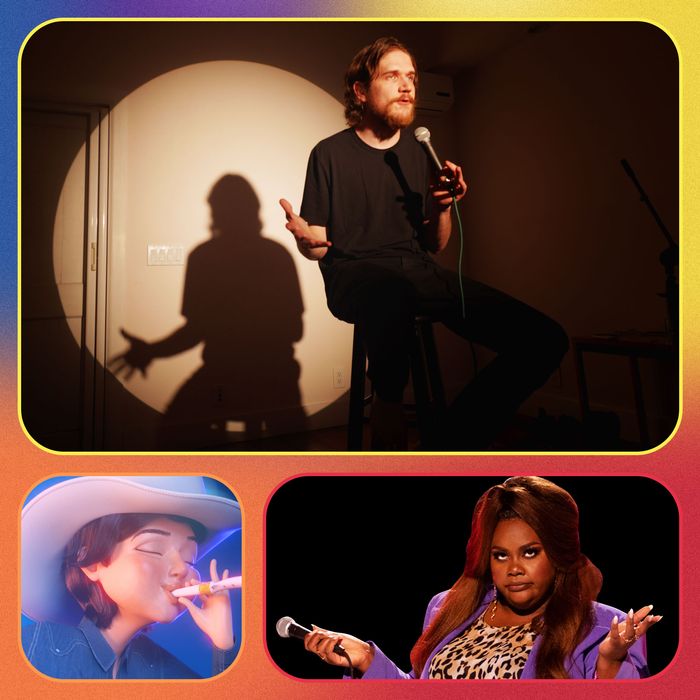
There have been some remarkably hilarious comedy specials in 2021, but there have not been many of them. There is no mystery about why that is, and there’s no reason to be worried about a long-term shift in great comedy specials of the future. Still, 2021 has proven to be a strange moment of inbetween, with much of comedy still oriented around or reflecting the enormous void of the last year and a half. In the past, this has been a list strictly of hour-long stand-up specials, and that limitation has been deliberate. It’s already hard to claim some kind of apples-to-apples comparison of work in such a malleable, often personal, always subjectively appealing form. Paring down the list, limiting it to one particular version of the art form, had the benefit of at least streamlining the process.
This year that would’ve been absurd. It still only considers what would be roughly an hour or more of material — I had to draw some arbitrary line! But a list that only considered traditional stand-up performed on a stage would’ve left out several of the best, funniest works of the year. More telling, perhaps, is that many of the specials that broke the mold are also those that felt most effective and striking, most able to comment on and joke about the world today. Will the list revert to the norm next year? Will this be an ongoing, permanent shift? Who knows! But even without the strange circumstances of this year, there’s something very exciting about this list’s formal experimentation and playfulness. It’s a pleasure to laugh at.
Editor’s note: Listen to Kathryn VanArendonk discuss her list of the best comedy specials of 2021 with Jesse David Fox in the below episode of Vulture’s Good One podcast:
10.
Fighting Words, Aida Rodriguez
Aida Rodriguez’s Fighting Words earns this spot for its first 45 minutes — a delightful, sometimes personal, always carefully constructed set of jokes about politics, culture, and, in particular, Rodriguez’s observations about colorism and Latinx communities. There’s a purposeful deliberateness to her material, which she often foregrounds in the joke itself: Here’s why I’m presenting this material this way; here’s why I need to make sure to put this idea in specific language. It would seem counter to some of the supposed rules of comedy (the “break shit and don’t apologize as long as it’s funny” school of thinking). But Fighting Words is a lovely demonstration of exactly how little those rules actually matter for a comedian like Rodriguez, who can tell her audience exactly what kind of joke she’s about to do and why she’s going to do it and still get a huge laugh. The unnecessary documentary at the end of the special is only a further demonstration of her skill; it makes you long to spend that time with her onstage again.
9.
BBW (Big Beautiful Weirdo), Nicole Byer
Nicole Byer is not one for subtlety. In BBW (Big, Beautiful Weirdo), she begins by performing a pole dance in a set of lingerie designed like a hamburger. Then she stands on the stage in a tall, flowing wig and grape-purple suit. Byer has a habit of freezing her face in exaggerated grimaces of exasperation or shock, of telling a joke in slide-whistle cascading tones, then pulling the silliest expression she can. It is purposely clownlike, like someone took the word broad and then blew it up to 72-point font. What distinguishes BBW is how controlled Byer’s absurd amplification can be. Some of her jokes rely on pop-culture references that aim at easy targets, but her more personal material is where she’s most effective.
8.
Vir Das, Ten on Ten
This stand-up “special” bends most of the rules of what I’d usually consider “an hour-long stand-up special.” Ten on Ten is not a full hour-long set a comic has been developing for months, filmed over a few nights of performances. It is a collection of what Indian comic Vir Das has planned as ten episodes of stand-up sets, each on a specific topic. (To date he has only released five, ranging from ten to 20 minutes long.)
Das is performing in the middle of a pandemic and simultaneously running the risk that he’ll get arrested for what he jokes about. His material is about all of that: freedom of speech, religious conflict, grieving, privilege and class, colonialism. It’s also so funny. Das has a knack for accents, for creating characters he can mock or undermine (especially Americans). He has even more of an instinct for jokes that point at something truly uncomfortable, slicing at Indian industrial oligarchies, government COVID cover-ups, religious stereotypes. Das jokes about this stuff because he feels it is worthwhile for his audience to have a space where someone says the obvious thing, where someone points at a familiar terribleness and says, “That’s terrible.” Freedom of speech, Das says, is like you and he are both on a train, and nearby, there’s a guy with his dick hanging out. “We can’t do anything about the dicks,” Das says. “I’m just talking to see if you see it too.”
7.
Here’s Everything, Ricky Velez
Comedy specials live and die on more than whether a comedian has a magnetic stage presence, but Ricky Velez has it in spades. Even better, his special Here’s Everything is an excellent union of the stage persona Velez creates and the material he delivers. It’s an explicitly introductory sort of hour, in a way that feels a little too direct: Here he is, here are all the notable facts about him, here are the things he expects you’ll see coming and the things that might surprise you. But when he lets the joke run for a while, and it transforms into something more elaborate and weird, Here’s Everything escapes that almost apologetic self-promotional sensation and becomes much more fun. Early in the special, there’s a long joke about buying drugs from dealers standing out in the ocean, and Velez’s flabbergasted retelling is downright joyful.
6.
Cold Lasagne Hate Myself 1999, James Acaster
Cold Lasagne Hate Myself 1999, filmed before the pandemic, is a two-hour tour de force of comedy about mental illness, how much James Acaster despises his own compulsion to perform, how much he hates most audiences and most British audiences in particular, and the frustration and alienation of being an increasingly famous person whose celebrity identity has become fully disconnected from his self. Acaster is a remarkable story-teller, a comedian who can identify one situation and spin it into an elaborate, multifaceted, and thematically rich narrative. The magic of Cold Lasagne comes from Acaster’s willingness to let himself and his own image sit at the center of the story he’s unspooling. His stage persona as the cooler-than-thou truth-teller gets unwound and dismantled as he pokes at all his deepest anxieties and vulnerabilities and then rebuilt again as something different and more fragile — truth-teller as self-medicator, as self-doubter. This makes it sound like a special built on tentative self-revelation, but the mastery of Cold Lasagne is in Acaster’s incredible stamina and comedic control.
5.
#(Hashtag), Josh Johnson
One of the challenges of stand-up right now is how to acknowledge the shared reality of the pandemic, while also letting audiences escape it. Josh Johnson’s special #(Hashtag) is a canny encapsulation of both of those things, the best representation so far of a comedy special that attempts to bridge what has happened with an effort to reincorporate that experience into the rest of life. Johnson does COVID material, and he talks about the nightmare of being alone with his own thoughts. But he also does a classic, well-executed joke about what women want in men, and one about racism that involves a bee stuck in his hair. It’s a special that feels shaky in moments, but still, the highs are high, and Johnson’s unflappable cool is completely winning.
4.
Drawn, Tig Notaro
Drawn is an animated special, developed from material Tig Notaro has been working on and recording for the past several years. Many of the jokes are developed from Notaro’s life, particularly her childhood and her several recent health crises. But the stories don’t all fit together neatly. With characteristic Notaro control, each one sprawls out into its own little world, defined by its own animation style. Some look more like claymation, some are soft and rounded, some are full of sharper angles and saturated colors, and all of them support Notaro’s work with the kind of surrealist, silly, infinite potential that animation can provide. There are hilarious visual asides, quick cuts and split screens, and the bright pop-y joy of it all plays perfectly against Notaro’s Sahara-dry delivery.
3.
Imperfect Messenger, Roy Wood Jr.
It’s tough to think of many comedians more reliably great than Roy Wood Jr., and Imperfect Messenger is the kind of special that proves it. It’s a recognizable evolution from the kind of work Wood has been doing in the past several years: The ideas are not new territory for him, but the jokes are extensions and refinements of themes he has touched on in the past. He has become deft at making comedy about race that holds the weight of an argument while still finding funny angles. The end of Imperfect Messenger includes a long joke about incarceration, the community where he grew up, and his sense of what older generations have given him. In its insight and self-deprecation, it’s a perfect encapsulation of what makes his comedy work so well. But he also balances that heaviness with some extremely ridiculous mimicry and accent material. In combination with his weightier topics, it makes for a beautiful, funny ride.
2.
Good Timing With Jo Firestone, Jo Firestone
Like Das’s Ten on Ten, Good Timing is the kind of special that might have been excluded from this list in previous years — very little of it is stand-up performed on a stage, and almost none of it involves Firestone doing the performance. In 2021, though, when so much comedy has been about adjusting to the new circumstances of performing in a pandemic, few things hit the nail on the head better than Jo Firestone’s Good Timing. The special is a filmed live workshop and performance with students from Firestone’s Zoom comedy class for seniors, all of whom are hilarious, endearing, and beautifully enthusiastic. Still, for as much as their comedy holds the hour together, Good Timing is also a shining expression of Firestone’s comedic sensibility. It plays out through her conversations with her students, her instruction and gently probing questions, and her transparent delight whenever a joke really lands.
Firestone does not frame it this way at all, but in the context of this year in comedy, it’s also hard not to see Good Timing as a sharp rebuke to a certain strain of defensive grandstanding about what comedy should be allowed to say. Firestone’s interviews of her students reorient the importance of good comedy away from the naughty bad-boy obsession with cancel culture; in Firestone’s worldview, performing and hearing comedy is healing and a vital part of what allows people to live well. Good Timing is interested in something much simpler and vastly more fascinating: what comedy can be, not for a select few comedian philosophers, but for everyone.
1.
Inside, Bo Burnham
Just because Bo Burnham’s Inside is the most blindingly obvious inclusion on this list does not make it deserve its spot any less. Burnham’s special consumed the comedy conversation all year, thanks to its multitudinous offerings (and also to the long tail of its media cycle, which has extended beyond its Netflix premiere and into an album release and a short theater run). It is comedy that points at the pandemic Zeitgeist while also being full of incisive commentary about internet culture that long predates it. It’s catchy, full of earworm songs with melodies and productions that stand as their own parodies but also undermine and play against Burnham’s lyrics. And it has an unusually rich visual component, because Burnham’s directing sensibility adds yet another layer of meaning and subversion to the interplay between his lyrics and his melodies. There are still years in front of us where we’ll be finding new art that is about the experience of 2020, but in the canon of 21st-century pandemic art, Inside is already one of the classics.
More From This Series
- What’s the Most Memorable TV Moment of 2021?
- The Best TV Trees of 2021
- The First Annual Golden Dolly Awards



